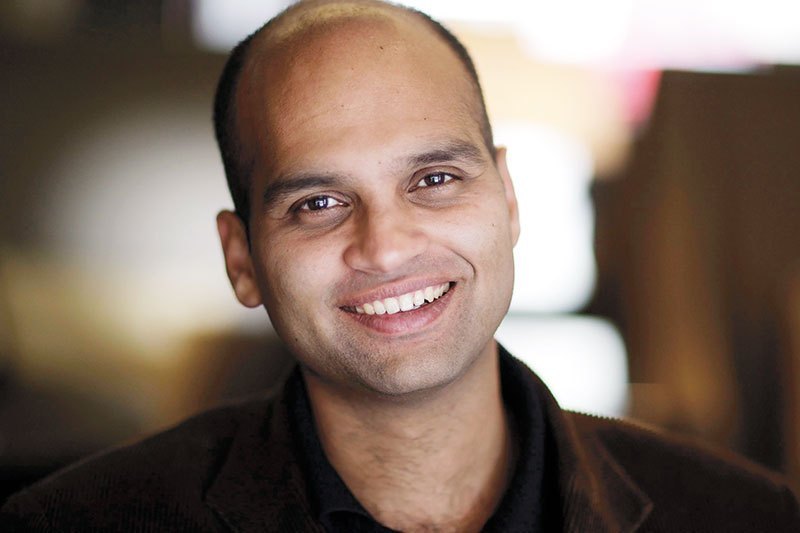De Indiase schrijver Aravind Adiga werd geboren in Madras op 23 oktober 1974 als kind van dr. K. Madhava Adiga en Usha Adiga. Hij groeide op in Mangalore en ging naar de Canara High School en de St. Aloysius High School, waar hij in 1990 succesvol examen deed. Nadat hij met zijn familie naar Sydney was geëmigreerd, bezocht hij de James Ruse Agricultural High School. Daarna volgde hij een studie Engelse literatuur aan de Columbia-universiteit, New York, die hij in 1997 afrondde als salutatorian (academische titel voor de op twee na beste student van het collegejaar). Hij studeerde vervolgens aan het Magdalen College in Oxford. Sindsdien werkt hij als journalist in Azië. Op het moment leeft hij in Mumbai. Adiga begon zijn journalistieke carrière als financieel journalist bij de Financial Times, het tijdschrift Money en de Wall Street Journal. Hierna kwam hij in dienst bij TIME, waar hij gedurende drie jaar correspondent was voor Zuid-Azië, voordat hij ten slotte verderging als freelancer. Gedurende deze freelance periode schreef hij zijn debuutroman “De witte tijger”. Voor “De witte tijger” kreeg hij in 2008 de Man Booker Prize.
Uit: The White Tiger
“Mr. Premier,
Sir.
Neither you nor I speak English, but there are some things that can be said only in English.
My ex-employer the late Mr. Ashok’s ex-wife, Pinky Madam, taught me one of these things; and at 11:32 p.m. today, which was about ten minutes ago, when the lady on All India Radio announced, “Premier Jiabao is coming to Bangalore next week,” I said that thing at once.
In fact, each time when great men like you visit our country I say it. Not that I have anything against great men. In my way, sir, I consider myself one of your kind. But whenever I see our prime minister and his distinguished sidekicks drive to the airport in black cars and get out and do namastes before you in front of a TV camera and tell you about how moral and saintly India is, I have to say that thing in English.
Now, you are visiting us this week, Your Excellency, aren’t you? All India Radio is usually reliable in these matters.
That was a joke, sir.
Ha!
That’s why I want to ask you directly if you really are coming to Bangalore. Because if you are, I have something important to tell you. See, the lady on the radio said, “Mr. Jiabao is on a mission: he wants to know the truth about Bangalore.”
My blood froze. If anyone knows the truth about Bangalore, it’s me.
Next, the lady announcer said, “Mr. Jiabao wants to meet some Indian entrepreneurs and hear the story of their success from their own lips.”
She explained a little. Apparently, sir, you Chinese are far ahead of us in every respect, except that you don’t have entrepreneurs. And our nation, though it has no drinking water, electricity, sewage system, public transportation, sense of hygiene, discipline, courtesy, or punctuality, does have entrepreneurs. Thousands and thousands of them. Especially in the field of technology. And these entrepreneurs — we entrepreneurs — have set up all these outsourcing companies that virtually run America now.
You hope to learn how to make a few Chinese entrepreneurs, that’s why you’re visiting. That made me feel good. But then it hit me that in keeping with international protocol, the prime minister and foreign minister of my country will meet you at the airport with garlands, small take-home sandalwood statues of Gandhi, and a booklet full of information about India’s past, present, and future.
That’s when I had to say that thing in English, sir. Out loud.”

